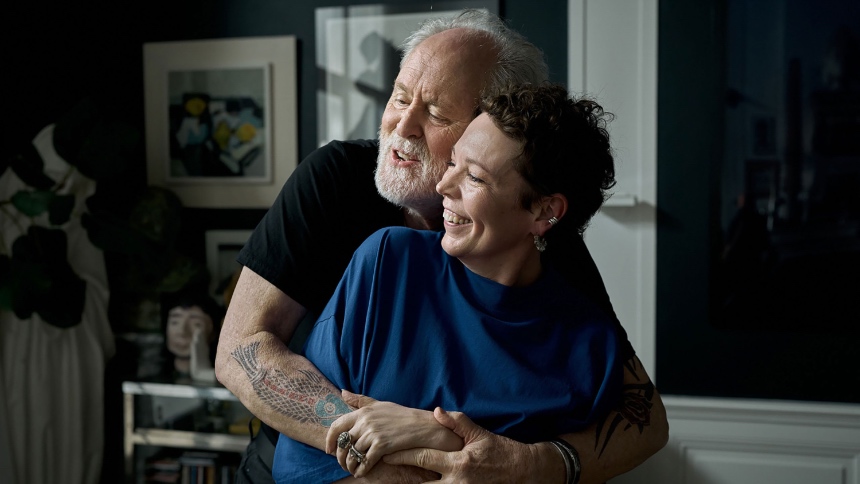Sundance 2025 Review: JIMPA, Generational Queer Drama Elevated By Authentic, Heartfelt Performances

With a career spanning six decades, two centuries, and more accolades than could fit in a single review, John Lithgow could have retired long ago to bask in much deserved critical acclaim and popular consideration.
Even as he approaches 80, however, Lithgow shows little, if any, sign of slowing down, just missing out on a much-deserved supporting Academy Award nomination as the duplicitous, scheming Cardinal Joseph Tremblay in Edward Berger’s (All Quiet on the Western Front) papal drama, Conclave.
An incredibly versatile actor with few peers, Lithgow’s latest role as the title character in writer-director Sophie Hyde’s (Good Luck to You, Leo Grande, 52 Tuesdays) queer-centered generational drama, Jimpa, shows him, once again, in an entirely differently light, delivering what should be considered a front-running performance for next year’s awards campaign. In stark contrast to his performance as the well-mannered, tightly controlled Tremblay (acting from the shoulders up), Lithgow’s performance in Jimpa redefines as an all-body, all-in, holistic approach.
A larger-than-life, old-school, unapologetically gay activist who’s lived his life to the absolute fullest in Amsterdam, his adopted hometown, Jimpa (as he’s nicknamed by his biological family) may be closer to the end of his life, but he refuses to live like it. Despite a stroke and a long recovery, Jimpa continues living with an emphasis on extracting as much physical pleasure (e.g., food, sex, more of either or both) as possible. He’s also a dedicated academic researcher and instructor, teaching at a local university, and at least from his own perspective, repeatedly proving himself worthy as a spokesperson for the ever-evolving LGBTQ movement (or most of it).
As depicted by Hyde and co-writer Matthew Cormack, the times, as Dylan once sang, are a’changing and despite his efforts, Jimpa has been left increasingly behind. Not that Jimpa will readily admit it. For all of his wit, humor, and intelligence, Jimpa refuses to acknowledge that his time has come and gone, and others, much younger and more attuned to changing social, cultural, and political ideas, should be allowed to lead and Jimpa to follow.
Into that internal conflict for Jimpa, Hyde adds a few more: Jimpa’s biological daughter, Hannah (Olivia Colman), an Australia-based writer-director; her husband, Richard (Eamon Farren); and their non-binary teen, Frances (Aud Mason-Hyde). Anxiety-ridden, feeling like an outcast in high school, Frances, long enamored with her grandfather’s mythic history, wants to relocate to Amsterdam and spend her last year in high school living with him.
It’s a fraught predicament for Hyde’s cast of well-developed, multi-dimensional characters, belying Hannah’s obvious absorption in the comforting fictions about herself, her father (and why he left), and what Jimpa, inevitably caught up in his own selfish, egotistical concerns, would offer Frances beyond the disappointment that usually accompanies reality and fiction colliding.
The intergenerational conflict doesn’t come to a head immediately, but after Hannah and company decide to visit Jimpa in Amsterdam -- ostensibly because it’s been a while and they haven’t visited since he suffered his stroke -- Jimpa (the film) settles into a prolonged state of comfortable domesticity, with Hannah and Jimpa, like most adults and their parents, setting aside long-ago, deeply felt, unresolved issues, and pretending otherwise, Frances just as inevitably meeting a group of queer teens and twenty-somethings and joining a ready-made, self-generating community (the first she can call her own).
With Frances’s “should she stay or should she go” decision looming over the film, Hyde turns Jimpa (the film) upside down, putting aside Frances’s decision and its impact on her immediate family for an end-of-life drama that effectively sidelines the title character — and with the title character, Lithgow — for the remainder of the film's running time. It’s fine, if slightly overdone, circling and spiraling until the characters onscreen make the inevitable, foregone conclusion. It certainly feels both heartfelt and authentic, but it also feels too much like a narrative bait-and-switch, used to dodge and avoid the central question and its related themes.
Still, for all of its third-act stumbles, Jimpa succeeds both as a showcase for its central performances, Lithgow chief among them, and, at least initially, as a compellingly insightful exploration of intergenerational drama, singular in its examination of three, not-so-liked minded generations, their differing worldviews and politics, and ultimately, on the universal experiences every family, no matter how connected or disconnected by time, space, or history, must face together.
Jimpa premiered at the 2025 Sundance Film Festival. Visit the film's page at the official festival site for more information.
Jimpa
Director(s)
- Sophie Hyde
Writer(s)
- Matthew Cormack
- Sophie Hyde
Cast
- John Lithgow
- Olivia Colman
- Eamon Farren

Do you feel this content is inappropriate or infringes upon your rights? Click here to report it, or see our DMCA policy.






